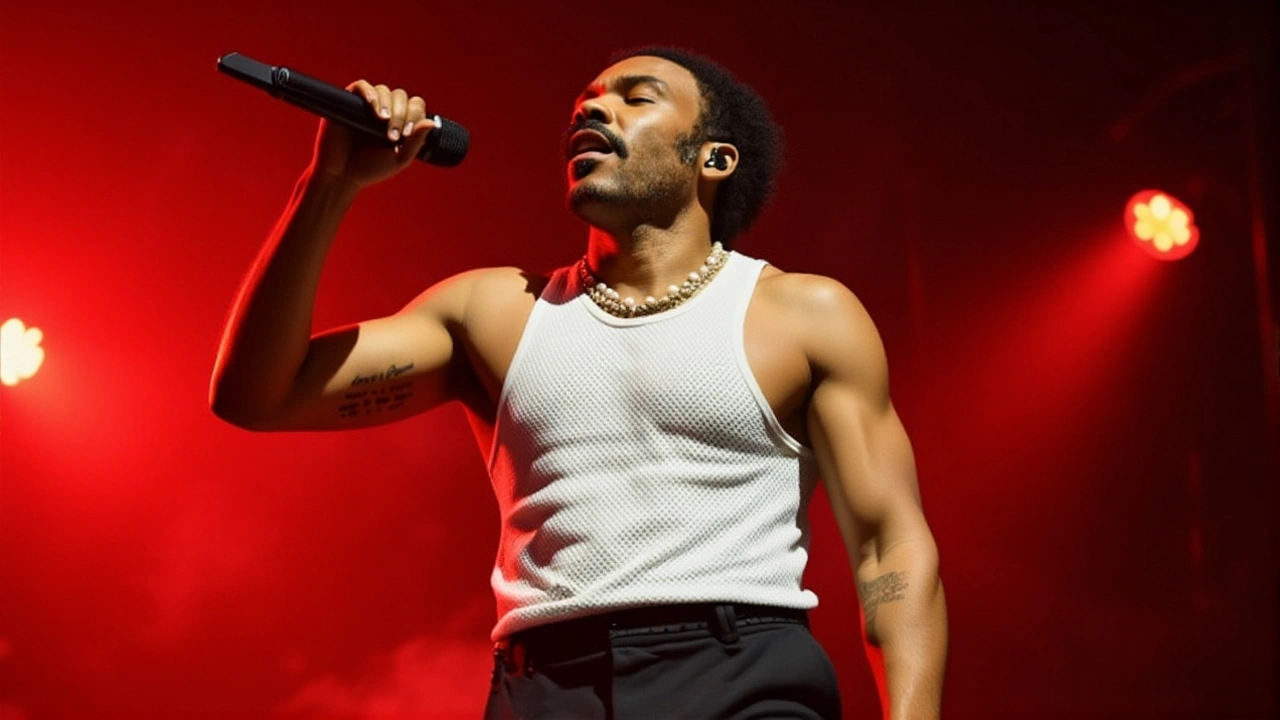Donald Glover Reveals He Had a Stroke and Heart Defect After Tour Cancellation
 Nov, 24 2025
Nov, 24 2025
On a Saturday night at Camp Flog Gnaw in Los Angeles, Donald Glover dropped a bombshell that left the crowd silent — and social media buzzing. The 42-year-old artist, known to millions as Childish Gambino, revealed he suffered a stroke last year, a medical crisis that forced him to cancel his entire tour. He didn’t just say it quietly. He told the whole stadium — raw, honest, and unfiltered — in a moment that felt more like a therapy session than a concert monologue.
"I Did the Show Anyway"
Glover described the moment everything changed during a performance in Louisiana. "I had a really bad pain in my head," he said, "and I did the show anyway." He couldn’t see clearly. His vision blurred. His body screamed for him to stop. But he kept going — because that’s what performers do. That’s what he’d always done. Afterward, the tour moved to Houston, where he finally went to the hospital. "The doctor was like, 'You had a stroke.'"That diagnosis came months after fans first noticed his absence. Official statements had called it an "ailment" — vague, polite, and uninformative. But now, the truth was out. And it was worse than anyone imagined.
The Hole in His Heart
The stroke wasn’t the only health bomb. During testing, doctors found a congenital defect — what Glover called "a hole" in his heart. Medically, this likely refers to a patent foramen ovale (PFO) or an atrial septal defect (ASD), both conditions where blood flows abnormally between the heart’s upper chambers. It’s rare in adults without symptoms, but when combined with a stroke, it becomes a critical red flag. He needed two surgeries to fix it. He didn’t say when. He didn’t say how long recovery took. But he made it clear: he was lucky to be alive."I felt like I was letting everyone down," he admitted. The weight of that guilt — of missing shows, of disappointing fans, of never making it to Ireland — hung heavy in his voice. He didn’t just cancel a tour. He canceled a promise. And that haunted him.

A Philosophical Turn
What followed wasn’t just a medical update. It was a life lesson. "They say everybody has two lives," Glover said, "and the second life starts when you realize you have one." He paused. Then: "You got one life, guys, and I gotta be honest — the life I’ve lived with you guys has been such a blessing."That quote — unattributed, but widely shared in self-help circles — landed like a prayer. It wasn’t performative. It felt earned. After surviving a stroke at 41, after two heart surgeries, after months of silence, he wasn’t just returning to the stage. He was redefining what it meant to be on it.
Who Knew? Who Didn’t?
His team at WME (William Morris Endeavor Entertainment LLC) didn’t respond to requests for comment. No press release. No statement. That silence spoke volumes. This wasn’t a carefully planned reveal. It was a moment of vulnerability — raw, spontaneous, and deeply human. The media, including ABC7 New York, reported it as breaking news. But for fans who’d followed his journey since "30 Minutes," since "Awaken, My Love!" — this felt like the final chapter of a long, quiet struggle.Strokes in people under 45 are uncommon — but not unheard of. The CDC reports that about 10% of strokes in the U.S. occur in adults under 50. Risk factors like congenital heart defects, high blood pressure, and even stress can contribute. Glover’s case highlights a chilling reality: you don’t have to be elderly to face a life-altering neurological event. He didn’t smoke. He didn’t drink excessively. He was an athlete on stage. And yet, his body betrayed him.

What’s Next?
No tour dates have been announced. No new music has been teased. Glover’s last album, Atavista, dropped in 2023 — a surprise release that felt like a farewell. Now, it reads like a farewell to his old life. He’s not just recovering. He’s reevaluating. And that’s okay.What’s clear is this: the entertainment world lost a brilliant performer for a year. But the person behind the music? He found something deeper. A second life. A quieter one. A more meaningful one.
Frequently Asked Questions
How common is a stroke in someone as young as Donald Glover?
Strokes in adults under 45 account for about 10% of all stroke cases in the U.S., according to the CDC. While less common than in older adults, risk factors like congenital heart defects, high blood pressure, obesity, and even extreme stress can trigger them. Glover’s case — a stroke linked to a heart defect — is a recognized, though rare, medical pathway.
What does "a hole in the heart" mean medically?
"A hole in the heart" typically refers to a patent foramen ovale (PFO) or atrial septal defect (ASD). These are openings between the heart’s upper chambers that usually close after birth. When they remain open, blood can bypass the lungs, increasing the risk of clots traveling to the brain — potentially causing a stroke. Surgery to close the defect is common and often successful, especially when caught early.
Why didn’t Donald Glover’s team release this information sooner?
WME, his agency, did not respond to media requests, suggesting the disclosure was unplanned and personal. Many artists avoid detailing health issues due to stigma, privacy, or fear of being seen as "unreliable." Glover’s spontaneous reveal at Camp Flog Gnaw indicates he wanted to speak for himself — not through a press release.
Is Donald Glover planning to return to music or touring?
There are no official announcements about future tours or albums. His last release, Atavista, came in 2023, and his public appearances since have been rare. Given his emotional reflection on life and his health struggles, any return will likely be deliberate — and possibly more introspective than before.
Why was the Ireland show so significant to him?
Ireland was one of the few countries Glover had never performed in — a personal milestone he’d talked about in interviews. Missing it wasn’t just a business loss; it was a symbolic failure. For an artist who connects deeply with fans, not fulfilling that promise carried emotional weight far beyond ticket sales.
What does this mean for other artists facing health crises?
Glover’s openness challenges the industry’s culture of silence around health. Too often, artists push through pain because they’re told to "never show weakness." His story reminds fans and peers alike that recovery isn’t failure — and that being honest about your body is the bravest thing a performer can do.